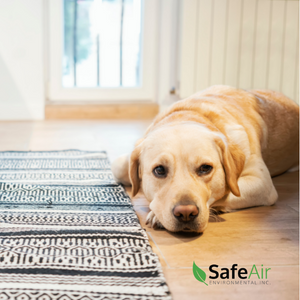Can Mold Make Your Dog Sick?
Posted in Mold, on September 26, 2022
When SafeAir talks about mold inspection in Toronto, we usually focus on the human members of our households — but our pets can also be affected by mold growth! Mold testing in Toronto benefits the whole family, whether they have two legs or four. While we’ve written extensively on the blog about mold exposure signs and symptoms in humans, it can be harder to know if it’s negatively affecting your pet dog — especially because our communication leaves much to the imagination!
Mold Species that May Affect your Dog
 There are thousands of mold species that can affect your pet — with their nose to the ground, dogs can experience an increased reaction to mold in your home. Some of the most common types of mold to affect dogs include:
There are thousands of mold species that can affect your pet — with their nose to the ground, dogs can experience an increased reaction to mold in your home. Some of the most common types of mold to affect dogs include:
- Aspergillus
- Fusarium
- Helminthosporium
- Hormodendrum
- Penicillium
- Phoma
Symptoms of Mold Exposure in Canines
Mold exposure symptoms in dogs are very similar to those in humans. Knowing what signs to look for will help you get a mold inspection in Toronto as soon as possible and provide your dog with the care they need. Some warning signs you can look out for include:
- Respiratory distress, such as rapid breathing or wheezing
- Unusual nasal discharge
- Coughing, sneezing
- Lethargy
- Bleeding from the nose or mouth
- Scratching, itching
- Skin sores or dry patches
Because the signs and symptoms of mold exposure in canines are similar to many other health conditions, it’s essential to visit your veterinarian as soon as you notice a change in your pet and schedule mold testing with the SafeAir team today.
What Happens if Your Dog Ingests Mold
Part of the reason dogs are so strongly affected by mold growth is that they’re always putting their mouths (and noses) into things! If your dog ingests something with mold, should you be worried?
Some mold species produce mycotoxins, which you may be able to guess from the name contain poisonous substances. The most common type of mycotoxins are tremorgenic, which means they contain a neurotoxin that may cause tremors or seizures.
If you suspect your dog has eaten something moldy or that mold may have caused a change in your dog’s habits, SafeAir recommends consulting your veterinarian as soon as possible.
How To Prevent Your Dog From Coming into Contact with Mold
Anyone who has had a dog or puppy knows it can be hard to prevent your pet from eating, licking, or nosing around where it shouldn’t. To decrease the chance your dog may be affected by mold growth or ingest something with mold, SafeAir recommends mold inspection in Toronto. This service helps the whole family by assessing your home’s risk of mold growth, uncovering any hidden infestations, and examining your entire indoor air quality environment. Air quality testing benefits everyone, and can help rule out the cause of various symptoms.
When it comes to indoor mold growth, prevention is key! Reducing architectural problems or lifestyle habits that may increase your or your pet’s likelihood of exposure to mold growth can help everyone rest easier — literally and figuratively.
To learn more about SafeAir and mold testing in Toronto, contact us today.

